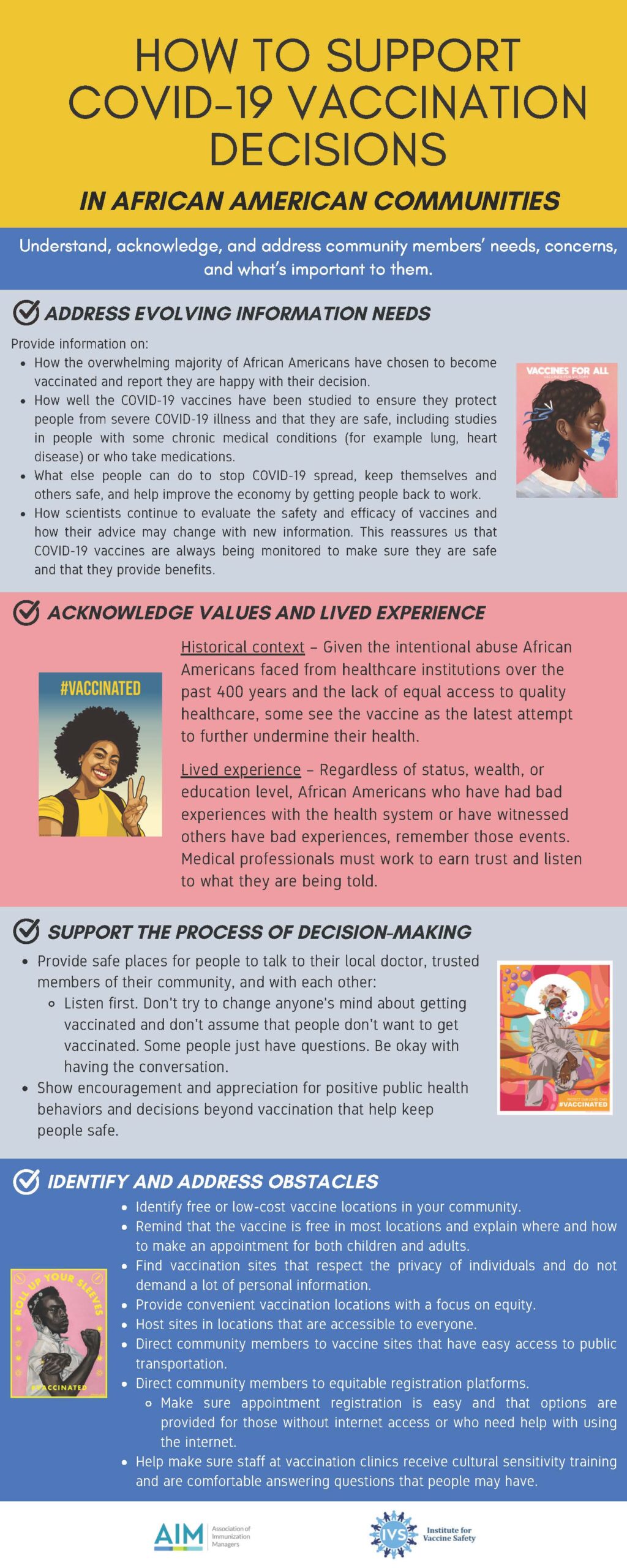How to Support COVID-19 Vaccination Decisions in African American Communities
Understand, acknowledge, and address community members’ needs, concerns, and what’s important to them.
Address Evolving Information Needs
Provide information on:
- How the overwhelming majority of African Americans have chosen to become vaccinated and report they are happy with their decision.
- How well the COVID-19 vaccines have been studied to ensure they protect people from severe COVID-19 illness and that they are safe, including studies in people with some chronic medical conditions (for example lung, heart disease) or who take medications.
- What else people can do to stop COVID-19 spread, keep themselves and others safe, and help improve the economy by getting people back to work.
- How scientists continue to evaluate the safety and efficacy of vaccines and how their advice may change with new information. This reassures us that COVID-19 vaccines are always being monitored to make sure they are safe and that they provide benefits.
Acknowledge Values and Lived Experience
Historical context – Given the intentional abuse African Americans faced from healthcare institutions over the past 400 years and the lack of equal access to quality healthcare, some see the vaccine as the latest attempt to further undermine their health.
Lived experience – Regardless of status, wealth, or education level, African Americans who have had bad experiences with the health system or have witnessed others have bad experiences, remember those events. Medical professionals must work to earn trust and listen to what they are being told.
Support the Process of Decision-Making
- Provide safe places for people to talk to their local doctor, trusted members of their community, and with each other:
- Listen first. Don’t try to change anyone’s mind about getting vaccinated and don’t assume that people don’t want to get vaccinated. Some people just have questions. Be okay with having the conversation.
- Show encouragement and appreciation for positive public health behaviors and decisions beyond vaccination that help keep people safe.
Identify and Address Obstacles
- Identify free or low-cost vaccine locations in your community.
- Remind that the vaccine is free in most locations and explain where and how to make an appointment for both children and adults.
- Find vaccination sites that respect the privacy of individuals and do not demand a lot of personal information.
- Provide convenient vaccination locations with a focus on equity.
- Host sites in locations that are accessible to everyone.
- Direct community members to vaccine sites that have easy access to public transportation.
- Direct community members to equitable registration platforms.
- Make sure appointment registration is easy and that options are provided for those without internet access or who need help with using the internet.
- Help make sure staff at vaccination clinics receive cultural sensitivity training and are comfortable answering questions that people may have.
This project is focused on how public health and other stakeholders can best understand and support decision-making as individuals consider if, and under what conditions, COVID-19 vaccination is right for them. Participants in these conversations were African Americans, Latinx, and Native Americans recruited from local communities or panel survey respondents from four U.S. regions (Northeast, Midwest, South, West) who had indicated that they were undecided about their intent to vaccinate now or in the future against COVID-19. This project is funded by Robert Wood Johnson Foundation and is a collaboration of AIM, NACCHO, Johns Hopkins, and other partners.

